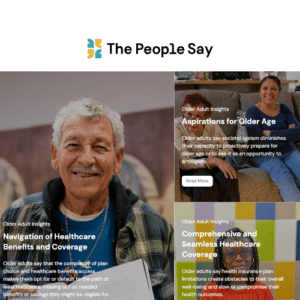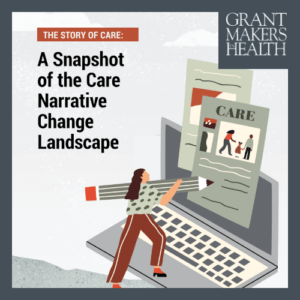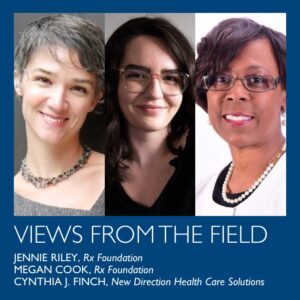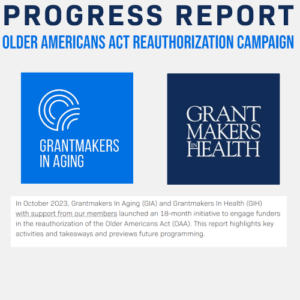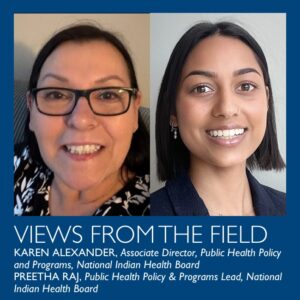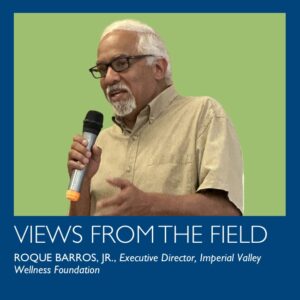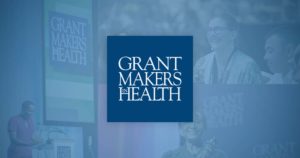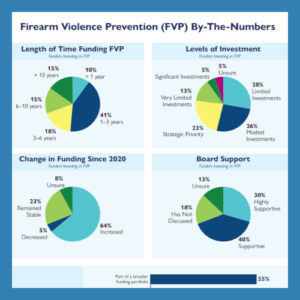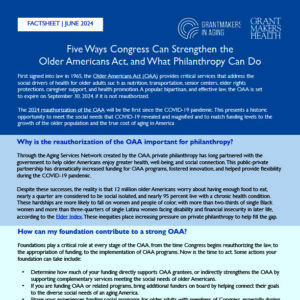Featured Resources
The People Say: A New Older Adult and Caregiver Policy and Research Tool
An online research hub features first-hand insights from older adults and caregivers on the issues most important to them, as well as feedback from experts on policies affecting older adults. The project particularly focuses on the experiences of communities often under-consulted in policymaking, including older adults of color, those who are low income, and/or those who live in rural areas where healthcare isn’t easily accessible.
The Story of Care: A Snapshot of the Care Narrative Change Landscape
At some point, every one of us will need care or need to provide care. The COVID-19 pandemic put a spotlight on the extraordinary contributions of caregivers and exposed the failings caused by our nation’s lack of care policies, especially for communities of color. Deploying narrative-change strategies across care-related issues will help create the conditions for cultural and policy progress. The goal of this report is to share with funders the promising narrative-change strategies and tactics that have been identified, a directory of funders and grantees who are supporting this work, and how philanthropy can best support this effort.
GIH Advocacy for the Reauthorization of the Older Americans Act (OAA)
The OAA provides critical services that address the social drivers of health for older adults. Grantmakers In Health (GIH) and Grantmakers In Aging (GIA) are partnering to engage funders in advancing the reauthorization of this important piece of legislation.
Explore Population Health Topics
Latest Resources
It Takes Many Villages to Create a Public Health Improvement Plan
Public health has gained attention in Colorado over the last four years as a result of a partnership that includes health foundations, the Colorado School of Public Health, the state legislature, and state and local health agencies.
Paid Sick Days: A Health Policy for Everyone
When the H1N1 pandemic broke out, the Centers for Disease Control and Prevention urged sick people to stay home. Unfortunately, for many Americans, staying home meant losing income, losing a good shift, or worse, losing their job.
The State of State Budgets
At a recent meeting of state health policymakers, California team members were asked to compare their budget problems with the Titanic’s sinking and determine which health initiatives were essential and worthy of being loaded into a lifeboat. One member quipped, “We’re just trying to figure out whom to EAT in the lifeboat!”
Shifting Paradigms in Promoting Oral Health for Young Children
Tooth decay remains the single most prevalent chronic disease of America’s children, affecting 44 percent by age six (Dye et al. 2007). Grantmakers, government, and the professions have long focused energy and resources on getting children into dental care to repair the ravages of this preventable disease and to eliminate associated pain and infection.
Collaboration Among Local Public Health Departments Preparing for Accreditation
The Kansas Health Foundation believes that all residents of Kansas deserve equal levels of public health protection and access to services regardless of where they live in the state. In partnership with the Kansas Association of Local Health Departments (KALHD), the foundation has worked to explore how regional collaboration among local health departments might strengthen these departments and support their efforts to become accredited.
Ensuring the Health of America’s Children: Progress and Opportunities
Behind the headlines of a weakened U.S. economy and rising unemployment are two related developments: the transformation of health care coverage into an issue of real salience to working families and the middle class, and the ways in which states have crafted, and will continue to craft, an effective response.
Publications and Reports
2024 Survey Summary: Firearm Violence Prevention Strategies
GIH conducted a survey in September 2024 about funder engagement in firearm violence prevention. This fact sheet summarizes the survey results with a total sample of 81 health funders. This public health crisis and social justice issue is preventable, and health funders have an important role to play in advancing firearm violence prevention efforts.
Progress Report: Older Americans Act Reauthorization Campaign
In October 2023, Grantmakers In Aging (GIA) and Grantmakers In Health (GIH) launched an 18-month initiative to engage funders in the reauthorization of the Older Americans Act (OAA). This report highlights key activities and takeaways and previews future programming.
Fact Sheet: Five Ways Congress Can Strengthen the Older Americans Act, and What Philanthropy Can Do
First signed into law in 1965, the Older Americans Act (OAA) provides critical services that address the social drivers of health for older adults such as nutrition, transportation, senior centers, elder rights protections, caregiver support, and health promotion. A popular, bipartisan, and effective law, the OAA is set to expire on September 30, 2024, if it is not reauthorized. Foundations play a critical role at every stage of the OAA, from the time Congress begins reauthorizing the law, to the appropriation of funding, to the implementation of OAA programs. Now is the time to act.
Connect With Funder Peers on Population Health
Interested in exchanging strategies, information, and questions with your funder peers? Sign up for GIH E-Forums.


